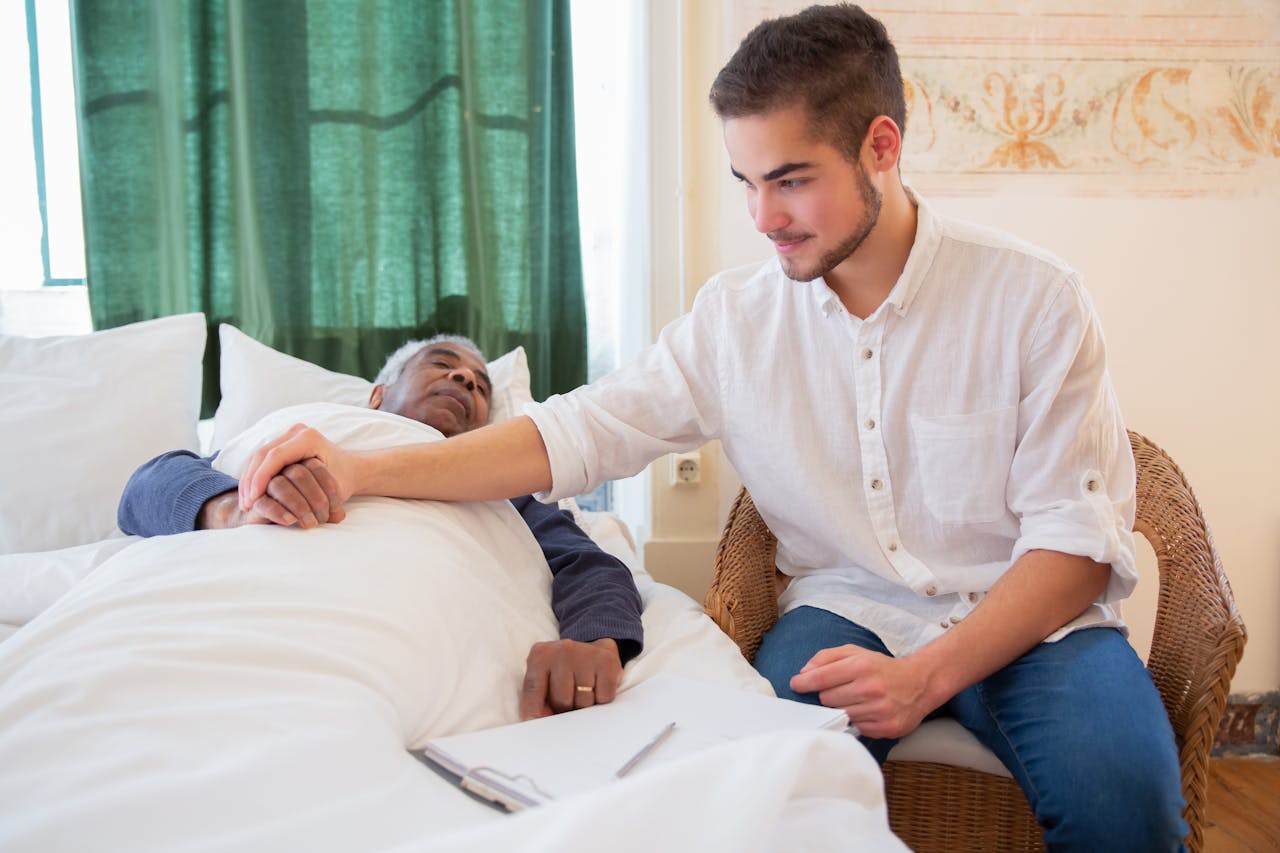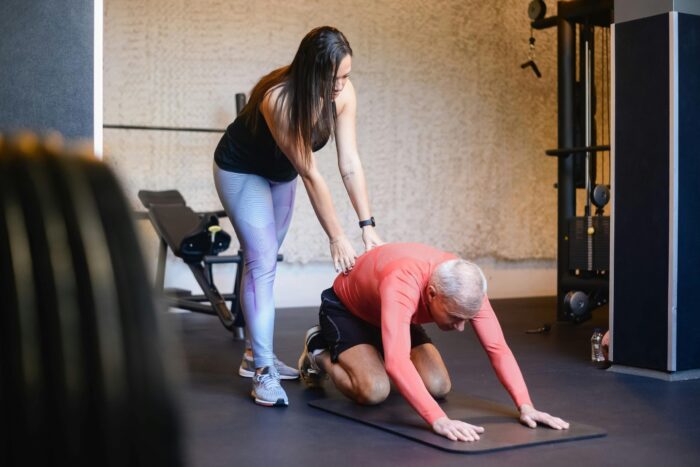What is Rehabilitation for Seniors?
Rehabilitation for seniors is a specialized healthcare service aimed at improving the physical, emotional, and cognitive well-being of older adults. It focuses on helping seniors recover from surgeries, illnesses, or injuries, enhancing their ability to perform daily activities independently. Rehabilitation programs may include physical therapy, occupational therapy, speech therapy, and sometimes psychological support.
These programs are designed to restore mobility, strength, and coordination, prevent falls, manage pain, and promote overall health. Rehabilitation can take place in various settings, including hospitals, outpatient clinics, and specialized rehab centers, and often involves a multidisciplinary team of healthcare professionals. The goal is to improve quality of life and enable seniors to live as independently as possible.

The Importance of Rehabilitation
Rehabilitation is essential in helping seniors regain independence and improve mobility after illness, injury, or surgery. As seniors face unique challenges in recovery, tailored rehabilitation programs are crucial for restoring physical function and enhancing quality of life. These programs focus on exercises and therapies designed to strengthen muscles, improve balance, and enhance coordination.
Physical therapy is a cornerstone of rehabilitation, providing customized exercises to rebuild strength and flexibility. Occupational therapy plays a significant role in helping seniors relearn daily activities, promoting self-sufficiency and reducing dependence on caregivers. For those recovering from strokes or other conditions affecting communication, speech therapy can be vital.
The benefits of rehabilitation extend beyond physical improvements. Regaining mobility and independence significantly boosts mental well-being, reducing the risk of depression and anxiety often associated with prolonged immobility or reliance on others. Additionally, social interactions during therapy sessions help combat loneliness and foster a sense of community.
Effective rehabilitation can also prevent further health complications by reducing the risk of falls and subsequent injuries. Personalized recovery plans empower seniors to lead active, fulfilling lives, maintaining their autonomy and dignity. Ultimately, rehabilitation is about more than just physical recovery; it’s about restoring the confidence and capabilities that enable seniors to enjoy a higher quality of life.
Understanding Geriatric Rehabilitation: Tailored Care for Older Adults
Geriatric rehabilitation focuses on the unique needs of older adults, aiming to help them regain independence, improve mobility, and enhance their quality of life after illness, injury, or surgery. Unlike general rehabilitation, which serves patients of all ages, geriatric rehabilitation incorporates specific principles and practices to address the complex health conditions of seniors.
Principles of Geriatric Rehabilitation
Assisted living residents typically include seniors who need help with daily activities, such as bathing, dressing, and medication management, but desire to maintain as much independence as possible.
Holistic Approach
This approach addresses physical, emotional, cognitive, and social aspects of health, ensuring comprehensive care for seniors.
Individualized Care Plans
Tailored to each senior’s medical history, current health status, and personal goals, these plans ensure personalized treatment.
Multidisciplinary Team
Involving geriatricians, physical therapists, occupational therapists, speech therapists, social workers, and dietitians, this collaborative effort covers all aspects of a senior’s health.
Focus on Functional Independence
Emphasizing activities of daily living (ADLs) like dressing, bathing, and cooking, geriatric rehabilitation helps seniors regain their independence and confidence.
Safety and Fall Prevention
Prioritizing safety, therapists assess and modify home environments, provide balance training, and educate on fall prevention.
Practices of Geriatric Rehabilitation
Physical Therapy
Customized exercises to improve strength, flexibility, balance, and endurance, accommodating chronic conditions common in seniors.
Occupational Therapy
Training in daily activities and use of adaptive devices to promote self-sufficiency.
Speech Therapy
Strategies to improve communication and swallowing functions.
Cognitive Rehabilitation
Activities to enhance memory and problem-solving skills, crucial for conditions like dementia.
Nutritional Support
Tailored dietary guidance to support recovery and overall health.
Psychosocial Support
Counseling and social activities to combat loneliness and promote mental well-being.
The Role of Physical Therapy in Senior Rehabilitation
Physical therapy is crucial in senior rehabilitation, helping older adults regain strength, flexibility, and mobility after illness, injury, or surgery. Seniors often face challenges such as muscle weakness, balance issues, and joint stiffness, which can impede daily activities and increase fall risk. Physical therapists design personalized exercise programs to address these issues, focusing on strength training, balance exercises, and flexibility routines. These programs accommodate chronic conditions common in seniors, such as arthritis or osteoporosis, ensuring safe and effective rehabilitation. By improving physical function, physical therapy helps seniors maintain independence and enhances their overall quality of life.
Occupational Therapy for Seniors: Enhancing Daily Living Skills
Occupational therapy is vital for seniors, as it focuses on enhancing their ability to perform daily living activities independently. This therapy addresses the physical, cognitive, and emotional challenges that can affect seniors’ ability to manage everyday tasks such as dressing, bathing, cooking, and managing medications. Occupational therapists provide training in the use of adaptive devices and techniques to make these tasks easier and safer. They also assess and modify home environments to reduce hazards and promote accessibility. By improving seniors’ functional abilities, occupational therapy boosts their confidence and self-esteem, contributing to a better quality of life.
Speech Therapy for Seniors: Improving Communication and Swallowing
Speech therapy is crucial for seniors, particularly those who have experienced strokes or neurological disorders affecting communication and swallowing. Speech-language pathologists work with seniors to improve speech, language, and cognitive-communication skills using specialized exercises and techniques. They also address swallowing difficulties (dysphagia) by teaching safe swallowing techniques and exercises to strengthen the relevant muscles. By improving communication and swallowing functions, speech therapy helps seniors maintain social connections, reduces the risk of aspiration and malnutrition, and enhances their overall quality of life.
Rehabilitation After a Stroke
Comprehensive Overview of Stroke Rehabilitation
Physical Therapy: Physical therapy is crucial for seniors recovering from a stroke, focusing on restoring movement, strength, and balance. Therapists design personalized exercise programs to enhance mobility, gait, and coordination. These exercises help improve physical function, prevent muscle atrophy, and reduce the risk of falls, thereby promoting greater independence and a higher quality of life.
Occupational Therapy: Occupational therapy helps seniors regain the ability to perform daily activities affected by a stroke. Therapists work on improving fine motor skills and coordination needed for tasks such as dressing, bathing, cooking, and managing medications. They may introduce adaptive devices and modify home environments to ensure safety and accessibility, enabling seniors to live more independently and confidently.
Speech Therapy: Speech therapy addresses communication and swallowing difficulties that often result from a stroke. Speech-language pathologists assist seniors in improving their speech, language, and cognitive-communication skills through targeted exercises. They also provide strategies to manage dysphagia (swallowing difficulties), reducing the risk of aspiration and malnutrition. Effective speech therapy enhances social interactions and overall quality of life for stroke survivors.
Recovering from Heart Conditions: Cardiac Rehabilitation
Components of Cardiac Rehabilitation
Medical Evaluation: The rehabilitation process begins with a comprehensive medical evaluation to assess cardiovascular health and create a personalized rehabilitation plan.
Exercise Training: A structured exercise program is designed to improve cardiovascular fitness. Under professional supervision, seniors engage in aerobic exercises, strength training, and flexibility activities, tailored to their fitness level and medical condition, promoting heart health and physical endurance.
Nutritional Counseling: Nutritional guidance helps seniors adopt heart-healthy eating habits. Dietitians provide meal plans emphasizing low-fat, low-sodium, and high-fiber foods, aiding in weight management and reducing risk factors for further cardiac events.
Education and Counseling: Education on heart health and risk factor management is crucial. Seniors learn about lifestyle changes, such as quitting smoking and managing stress. Counseling sessions address emotional and psychological aspects, providing support for coping with the aftermath of cardiac events.
Benefits of Cardiac Rehabilitation
Improved Heart Health: Regular, supervised exercise strengthens the heart, improves circulation, and lowers blood pressure and cholesterol levels, reducing the risk of future cardiac events.
Enhanced Physical Fitness: Tailored exercise programs help seniors regain strength and endurance, making daily activities easier and reducing the likelihood of further health complications.
Better Quality of Life: Education and lifestyle modifications promote overall well-being, enabling seniors to lead active, fulfilling lives. Emotional support helps manage anxiety and depression related to cardiac conditions.
Reduced Hospital Readmissions: By addressing risk factors and promoting healthier lifestyles, cardiac rehabilitation reduces the likelihood of rehospitalization due to heart-related issues.
Preparing for Rehabilitation: What Seniors and Caregivers Need to Know
Preparing for rehabilitation is a crucial step for seniors and their caregivers to ensure a smooth and effective recovery process. Understanding what to expect and making the necessary arrangements can significantly enhance the rehabilitation experience.
Understanding the Rehabilitation Process: Seniors and caregivers should begin by learning about the specific rehabilitation program recommended by the healthcare provider. This includes understanding the goals, duration, and types of therapies involved, such as physical, occupational, and speech therapy. Knowing what to expect can help set realistic goals and reduce anxiety.
Medical and Personal Information: Gather all relevant medical records, including recent medical history, medications, and any previous therapy notes. This information will help the rehabilitation team create a tailored plan. Additionally, ensure that any personal preferences or special needs are communicated to the therapists.
Home Environment Preparation: Preparing the home environment is essential for a safe transition post-rehabilitation. This might include installing grab bars, ramps, and ensuring that the living spaces are free of obstacles. Creating a safe and accessible environment will facilitate independence and reduce the risk of falls.
Emotional and Psychological Support: Rehabilitation can be emotionally challenging. Caregivers should be prepared to offer emotional support and encouragement. Engaging in positive reinforcement and celebrating small milestones can boost the senior’s morale.
Logistics and Scheduling: Plan for transportation to and from rehabilitation sessions if they are conducted outside the home. Ensure that the schedule is manageable and that there is sufficient time for rest and recovery.
Nutrition and Hydration: Proper nutrition and hydration are vital for recovery. Caregivers should ensure that the senior has a balanced diet that supports healing and overall health.
Financial Considerations in Senior Rehabilitation: Navigating Insurance and Costs
| Service | Average Cost | Notes |
|---|---|---|
| Initial Evaluation | $150 – $250 | One-time cost for initial assessment and plan creation |
| Physical Therapy Session | $75 – $200 per session | Cost per session, typically 1-3 times per week |
| Occupational Therapy Session | $75 – $200 per session | Cost per session, typically 1-3 times per week |
| Speech Therapy Session | $75 – $200 per session | Cost per session, typically 1-3 times per week |
| Home Health Aide | $20 – $30 per hour | Assistance with daily activities at home |
| Medical Equipment | $50 – $500+ | Items like walkers, grab bars, or specialized beds |
| Home Modifications | $200 – $5,000+ | Cost for modifications like ramps, railings, etc. |
| Transportation | $15 – $50 per trip | Cost for transport to and from rehabilitation facilities |
| Nutritional Counseling | $50 – $150 per session | One-time or ongoing sessions |
| Insurance Co-Pays | Variable | Depends on insurance coverage and policy terms |
| Out-of-Pocket Maximum | Variable | Maximum out-of-pocket expenses per year |
Rehabilitation Centers: Encompass Rehabilitation and Physical Medicine
Rehabilitation centers play a vital role in helping individuals recover from illnesses, injuries, or surgeries, especially seniors who require specialized care. These centers offer comprehensive rehabilitation services aimed at restoring physical, cognitive, and emotional health, enabling patients to regain independence and improve their quality of life.
Encompass Rehabilitation: Encompass Health Rehabilitation Hospital is an example of a leading provider in this field. They offer a wide range of services, including inpatient and outpatient rehabilitation, tailored to meet the unique needs of each patient. Their approach involves a multidisciplinary team of specialists, including physicians, therapists, and nurses, working collaboratively to deliver personalized care plans.
Physical Medicine and Rehabilitation (PM&R): Also known as physiatry, PM&R focuses on enhancing and restoring functional ability and quality of life to those with physical impairments or disabilities. Physiatrists, who are medical doctors specializing in this field, oversee the rehabilitation process, ensuring that each aspect of a patient’s recovery is addressed. They coordinate with physical therapists, occupational therapists, and speech therapists to provide a holistic treatment plan.
Services Offered: Rehabilitation centers like Encompass Health provide services such as physical therapy to improve mobility and strength, occupational therapy to enhance daily living skills, and speech therapy to address communication and swallowing difficulties. They also offer pain management, neurological rehabilitation, and cardiopulmonary rehabilitation, among other specialized programs.
Benefits: The comprehensive care provided by rehabilitation centers significantly improves recovery outcomes, reduces hospital readmissions, and helps patients achieve a higher level of independence and well-being.
Related Articles

What is Palliative Care?
Palliative care is a specialized medical care approach focused on providing relief from the symptoms and stress of a serious illness.

Understanding Assisted Living
Assisted living provides older adults with a residential option that combines housing, personal care, and health services.

Introduction to Nursing Homes
Assisted living offers daily support and independence; nursing homes provide 24/7 medical care;

Benefits of Yoga for Seniors
Discover how yoga can enhance flexibility, balance, and mental well-being
